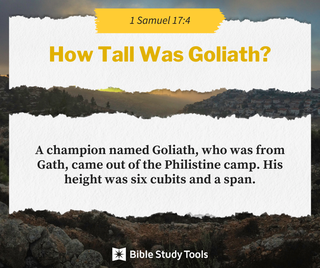
- Recent Translations
- All Translations
1 Samuel 17:20
Share
Settings
Images for 1 Samuel 17:20

1 Samuel 17:20 Meaning and Commentary
And David rose up early in the morning
Being very ready and eager to obey his father's orders, and visit his brethren:
and left the sheep with a keeper;
which showed his care and faithfulness in the discharge of his office; he was not unmindful of his father's sheep, any more than of his commands:
and took;
the ephah of parched corn, the ten loaves, and the ten cheeses:
and went, as Jesse had commanded him;
went and carried them to the camp, according to his orders:
and he came to the trench;
foss or ditch, which was cast up all around the army, partly to prevent the enemy falling on them before, and partly to prevent deserters from them behind; or the word signifying a wagon or carriage, which is here used, this might be a fence around the camp made of wagons fastened to each other; though it may only signify, the camp itself, which lay in a circular form, with proper guards about it to watch the enemy. Now David came up to it just
as the host was going forth to the fight;
preparing and getting every thing ready to the battle, and in motion, and upon the march to meet the enemy:
and shouted for the battle;
which was usually done when about to make the onset, to animate the soldiers, and strike the greater terror into the enemy; and this noise was sometimes made with the voice in a hideous and howling way, and was called "barritus" F1 by the Romans; with the Trojans it was like the noise of cranes in the air F2; it was also attended with the clashing of shields and spears F3; with the Persians, it was a rough, boisterous, and confused noise F4.
F1 Vid. Valtrimum de re militar. Roman. l. 5. c. 3. p. 314, 315. & A. Gell. Noct. Attic. l. 1. c. 11.
F2 Homer. Iliad. 3. ver. 1, 2, 3.
F3 Vid. Lydium de re militari, l. 4. c. 3. p. 158, 159.
F4 Curt. Hist. l. 3. c. 10. Vid. Alex. ab Alex. Genial. Dier. l. 4. c. 7.